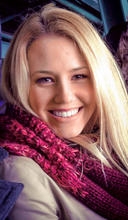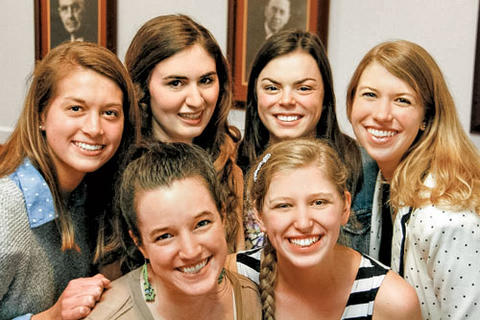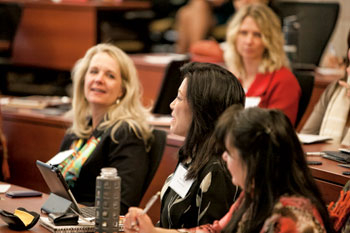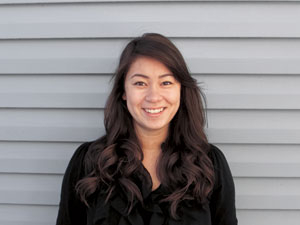
Supporting Tomorrow's Women Business Leaders
Wednesday, May 20, 2015
From its earliest days, the Carlson School has encouraged and supported its female students on their path to leadership roles in the business community. The University Business Women’s Club was founded in 1930 and regularly met in the basement of Vincent Hall for lunch. Three women won the prestigious Tomato Can Loving Cup Award in the 1930s, including Mary Jean (Thompson) Ritter, who spoke glowingly about the Business Women’s Club support of women in the workplace.
In 1937, the same year Ritter was presented with the Tomato Can Loving Cup, the first MBA at the University of Minnesota was granted. It was to a male student, but only three years later in December of 1940, Ethel Irene Hansen was the first woman to earn an MBA at the U—the sixth overall—and quite possibly, the first woman MBA recipient in the country.
Over the years, the number of female students at the Carlson School has increased dramatically. Today, 47 percent of undergraduate freshmen are female—up from 43 percent last year—and Part-Time and Full-Time MBA classes are 35 percent and 25 percent female, respectively, which is comparable to years past. This year’s Executive MBA program boasts 33 percent of its students as female, a jump from 22 percent in 2013.
“While the state of our school and our business community are stronger than they have ever been, that doesn’t mean we are by any means content or intend to maintain the status quo. Quite the opposite. We have a tremendous opportunity to make this school and business even better,” says Director of Diversity Recruitment and Inclusion Penny Momon. “Did you know that currently just 21 of the chief executives of today’s Fortune 500 companies are women? If we are going to increase the number of women in the C-suite we must have a holistic approach to supporting women throughout their careers. We have identified three key themes and believe we have the ability to affect real change.”
These three themes are access, empowerment, and progression and are related to different stages in a woman’s career path. Access involves increasing women’s enrollment in key programs and developing “on-ramp” programs for mid-career women. Empowerment includes offering more leadership and career development programming. Progression refers to when women need to make work-life choices and find themselves stepping in and out of the workforce. These themes can be challenges for women, but the Carlson School strives to make them surmountable.
Giving back
Offering new programs and buttressing existing offerings are some ways to meet these challenges, but they aren’t exhaustive. Another way is through helpful guidance from someone already in the trenches, such as Lauren Stoneberg, ’10 BSB. Stoneberg is involved in the Undergraduate Mentor Program, of which she is very familiar, as she was a mentee herself as an undergraduate. Now a mentor, she gives back to students the wisdom she has acquired in the workplace.
After graduating from the Carlson School, she began an 18-month marketing rotational program at Ameriprise Financial. From there, she joined the digital marketing team and developed great interest in building strategies in response to evolving technology. This summer, after graduating with her MBA, she will join Verizon’s Leadership Development Program in Basking Ridge, New Jersey.
“As an undergrad, I took part in the mentorship program with the goal of understanding what roles in the marketing profession appealed to me,” she says. “My biggest realization was that the value of a mentoring relationship was worth only as much as I put into it.”
She was encouraged to get back involved with the mentorship program during her time at Ameriprise. “I learned two big lessons in that initial year. First, mentorship—and therefore, people leadership— is a challenge to do well. Personal experiences can be easily recounted, but what takes work is drawing upon those experiences to help another shape and achieve his or her goals,” she says. “Second, I realized that even early in my career I had information and experience that was of value to someone.”
“I encourage my mentees to invest time in relationships and bridge-building,” she says. “Additionally, I think one of the biggest challenges for young, professional women today is owning their ambition. Whatever that ambition looks like—climbing the corporate ladder, writing a book, earning their own show on the Food Network—women should be empowered to pour themselves into it, without condemnation. In each of my mentoring relationships, I strive to pass along an attitude my father, Brad Stoneberg [’81 BSB], instilled in me: don’t play to avoid losing, play to win.”
Women’s clubs
Peer support for female students takes many forms. At the Carlson School, Women in Business (WIB) and MBA Women International (MBAWI) provide networking and opportunities to both undergraduate and graduate students.
With 271 members, WIB is one of the largest student groups on campus. Open to both Carlson School and non-Carlson undergraduates, WIB is dedicated to bringing together students and professionals to learn about important business topics. It holds speaker meetings twice a month, has monthly volunteer and social events, and hosts a signature networking event each semester.
“Our organization is an opportunity for members to meet other women with similar interests, foster community through social and philanthropic events, and provide space for growth,” says President Laura Studer. “In WIB, I have found an amazing group of women that inspire me to work hard every single day and strive for a balance in my professional ambitions and personal goals.”
MBAWI—formerly known as the National Association of Women MBAs—was formed to empower graduate women in business and propel more women into leadership positions. All MBA students automatically become members when they start their program. Both men and women MBA students are members, but women are more active in the events.
“MBAWI provides opportunities to connect with women who have been successful in their careers and learn from them,” says President Svetlana Sandberg. “It also promotes the confidence in women to reach for leadership positions.”
The big event for MBAWI is the Women’s Leadership Conference. The conference, celebrating its 11th year in 2015, is a one-day event that features keynote addresses by leaders who have a passion for diversity, workshops, and panel discussions to engage seasoned professionals on important issues. Last year, more than 400 people attended this wildly popular event.
Gender in Finance
A relatively new event, Gender Balance in Finance, is hosted by the Carlson Funds Enterprise. This annual event allows community members to address tough questions such as why so few women are long-term participants in the finance industry.
“We hope to encourage women to enter the finance field as well as assist those already in their career to find ways to successfully navigate the obstacles they may encounter along the way,” says Program Associate Bonnie Till. “With our keynote speakers and panelists, we invite women, men, and organizations to join with us in building the inclusion that will make business, society, and lives change for the better.”
The event was originally spearheaded by former Carlson School Fixed Income Fund Director Jeannette Parr. “As a female in the finance industry, Jeannette became increasingly aware of the lack of women in finance roles and wanted to find a way to reverse this trend,” Till says. “Diversity is such a valuable asset to any organization and the finance industry is at a great disadvantage with so few females being represented.”
Till says one of the biggest takeaways from the last two Gender Balance in Finance events was that men really do need to be a part of the discussion and solution. “There were many male attendees who were excited to be involved and were willing to share the message with their organizations,” she says. “Unfortunately, many attendees were still frustrated that there wasn’t a concrete reason as to why there are still few females in the industry and how this situation can be resolved. As our events carry forward from one year to another, we wish to have more discussion around these questions in hopes of finding an answer.”
MN Cup
The MN Cup, the largest statewide new venture competition in the country, is anxious to see more women entrepreneurs. In 2014, the program launched its Women in Entrepreneurship Series—events focusing on specific challenges and opportunities women face each day as entrepreneurs.
Also launched was SPUR, an event series hosted by women business owners and leaders that offers insight and advice to women students on their career options.
The events show signs of paying off as 34 percent of last year’s MN Cup applicants were female. This figure jumps to 45 percent when including entries with at least one female member on the team.
“Our goal at MN Cup is to provide a community and welcoming environment that boasts great resources, mentors, and connections for women-led startups,” says MN Cup Director Melissa Kjolsing. “By creating programs for undergraduate women students curious about entrepreneurship, we are expanding our pipeline of entrepreneurial talent.”
High school programs
Even before they are out of high school, female students have the opportunity to experience leadership opportunities in the business world. The Carlson School’s Women Mean Business program is a seven-day residential leadership experience open to high school juniors and seniors. In this program, students explore MIS, supply chain and operations, and other business-related fields as well as meet women leaders and learn first-hand how they can excel in business.
Another program, GopherBusiness, is open to both high school males and females. Like Women Mean Business, it provides students with a window into the world of business. Mindy McGrew attended GopherBusiness in 2010 when she was attending Eden Prairie High School. Now, she is an accounting and marketing double major and is planning for her CPA exam. She says she applied to GopherBusiness on a whim as it was a new program at the time, but the results were life-changing.
“The entire experience is something I wish every student had the opportunity to do as a high school student. It truly shows you not only what business classes and business careers are like, but what college life is like,” she says. “I am still friends with so many of the high school students I met during that week. It has been like gaining a family at the Carlson School.”
Announcing New Program for Women Executives
Beginning this fall, Carlson Executive Education will launch a new two-day program called Women in Leadership, designed to help women more effectively manage their careers and their environments.
Class participants will enjoy two classroom days and will take a Leadership Circle Assessment. "The assessment tool results will stimulate classroom conversation and enable participants to create a career action plan to help take them to the next level," says Executive Education Business Development Manager Delphine Aubourg.
Participants will learn all the ways gender dynamics shape their career and leadership opportunities and build critical skills in there areas:
- Identifying and improving leadership styles and amplifying strengths
- Enhancing communication skills, confidence, and competence in negotiations
- Strenghtening key networks and partnerships
- Learning how to better communicate, negotiate, and form strategic alliances
- Weighing wellness and work/life balance



